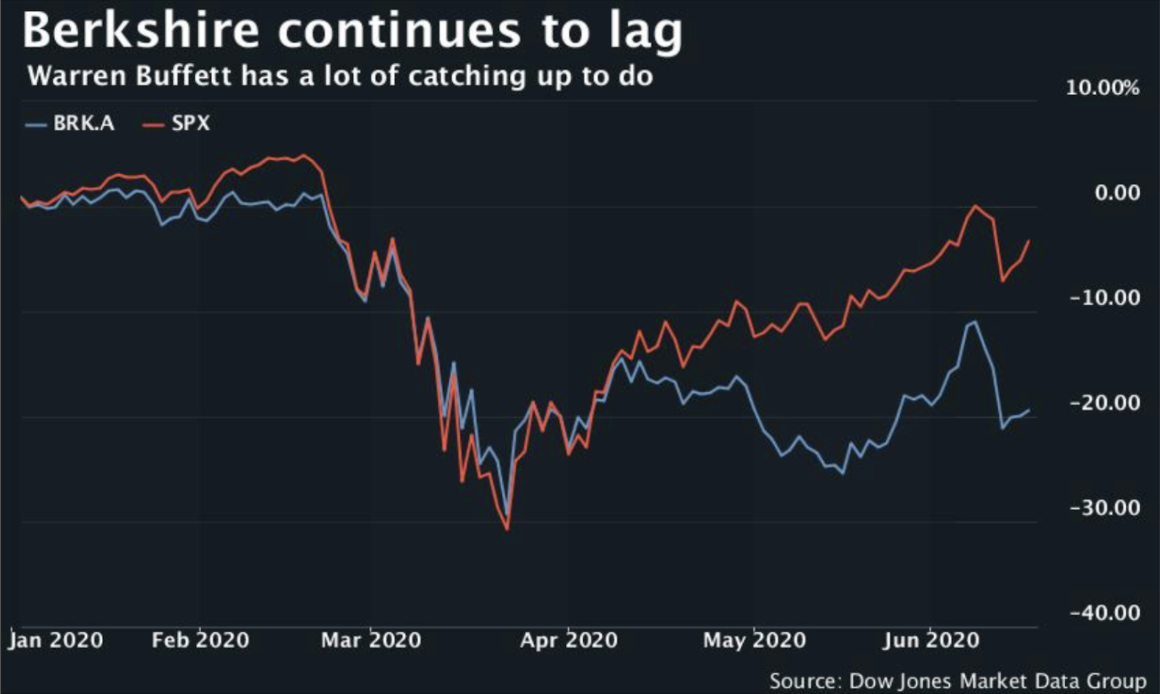Legendary investors such as Warren Buffett have been getting a lot of flak lately for standing by and watching amateur investors pour into free-trading platforms with contrarian bets that have beat the professionals at their own game.
But that’s not what worries some about Buffett and his Berkshire Hathaway portfolio.
It’s not amateurs betting on an airline rebound when Buffett is shedding airline stocks that will turn the tables. Airlines are fundamentally in big trouble. Buffett is right.
There are, of course, plenty who would also point out that it may not be wise to write off a legendary investor who has seen five and half decades of a brilliant performance. They will point out, for instance, that while the S&P 500 has risen 19,784% since 1965, Berkshire Hathaway’s per share market value has far outshined that--rising over 2,700,000%.
But all good things come to an end--whether this is one of them or not is one of the biggest topics of debate in the investing world.
The flip side here sees a scenario in which Buffett may be caught failing to heed his own mantra: “You only find out who is swimming naked when the tide goes out.”
As BlackRock takes over Wall Street, and both JPMorgan and Goldman Sachs scramble to find their own new niche (for JPMorgan it is apparently shaping up to be bitcoin, while Goldman is jumping on the clean energy train with BlackRock), sustainable investing is now even more than a megatrend …
It’s the ultimate risk-mitigator, and today’s investing environment is riddled with risk that has come to the forefront much more visibly with the COVID-19 pandemic.
ESG (environmental, social and governance) investing is already returning 3% more than the S&P 500 and is shaping up to be not just an outperformer, but a complete alternative to the index.
Everyone is exposed now and risk to investors comes in the form of everything from crisis management and bad governance to climate change and pandemic. It’s no longer enough to simply fall on one side of a gaping political divide. This is about making money, and big money now recognizes big risk.
So where does Berkshire Hathaway stand in an ESG investing scenario?
As noted by the Financial Times, in 2019, Buffett saw his worst performance against the S&P 500 in a decade.
Now, FT notes, 2020 is looking pretty much the same, with Buffett turning into a “casualty” of the COVID-19 pandemic, rather than a beneficiary.
Now, some are apparently questioning Berkshire Hathaway’s long-term direction--especially those who are closely watching the ESG investing explosion.
Yes, there is a lot of talk about Buffett now being, well … too old school. One of the reasons for that is his miss on Amazon, for which Berkshire has only a small stake, because it apparently doesn’t understand the company enough.
Missing out on big tech is one thing. Missing out on ESG is yet another.

Even before the pandemic, the talk consuming boardrooms was about ESG investing. The pandemic cemented that. As MarketWatch notes, in August 2019, the Business Roundtable (BRGT) “promised a new world order of multi-stakeholder capitalism”.
It’s possible that Buffett has landed on the wrong side of the ESG trend. He has opined, as recently as January this year, that “this is shareholders’ money” and social beliefs should not guide company decisions.
"Many corporate managers deplore governmental allocation of the taxpayer's dollar, but embrace enthusiastically their own allocation of the shareholder's dollar,” he told the Financial Times at the time.
But Buffett has also noted that this is a pedantic argument: It’s not necessarily moral arbitration, it’s risk management that brings about new opportunities. He understands that companies who do not manage their footprint are not taking care of their shareholders’ long-term needs.
That suggests that Buffett sees the ESG investing megatrend. Still, Berkshire Hathaway’s portfolio doesn’t seem to be embracing that knowledge.
By Michael Kern for Safehaven.com
More Top Reads From Safehaven.com:
















